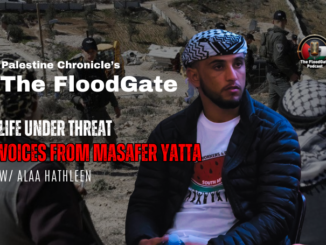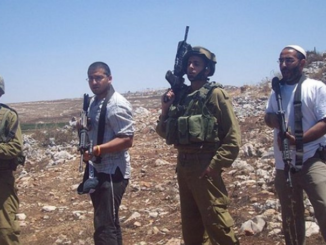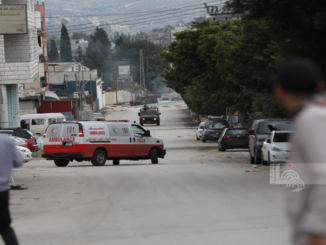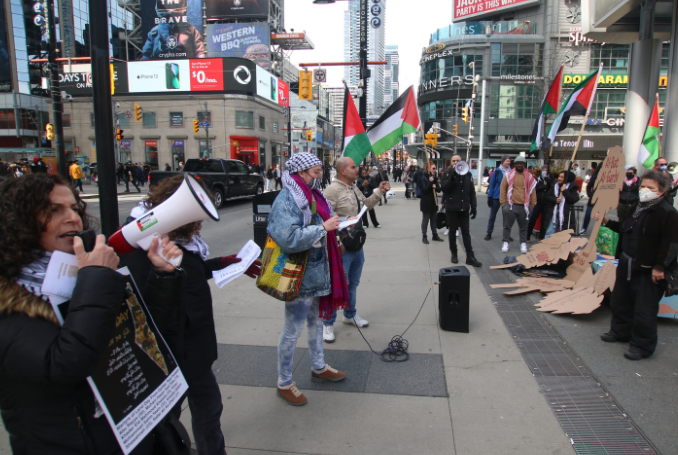
Last weekend, I was at a Palestinian demonstration in Toronto, commemorating Land Day. It was held in one of the city’s most visible downtown areas–Dundas Square.
During the speeches, a passerby decided to interrupt. He came quite close to the demonstrators and shouted at the speaker, “What about the Israelis who were killed this week?” Most of the demonstrators ignored him, some bristled. Eventually, when he got no answer he left, no less upset as when he arrived.
It didn’t hit me at that moment, but later I thought to have done what he did, by himself and with confidence, must require that he have absolutely no appreciation for the gravity of Israeli criminality. And by that, I mean that he fails to understand the constant suffering and harm that Israel has caused Palestinians for decades, which coincidentally was why the demonstration, in part, was happening.
The belligerent tone of his question, aside from the question itself, reveals that he, like many others, believes that Israel and Palestine are at war. That they are more or less balanced in power and that they fighting a zero-sum game where the winner takes all, be that land, resources, etc.
Likely for him, Palestinians are “terrorists” and not allowed to resist. His indignancy also seemed to convey that he viewed the killings as unconnected to any historical or causal dynamic. One that involves Israel, as it has, driving Palestinians to the edge, a near point of despair where they are forced to be violent. That’s inevitable when you oppress any group whatsoever for too long, though no duration of oppression is permissible.
No compelling reasons can ever justify the killing of innocent civilians. Human life is precious. But we are irresponsible when we refuse to examine what accounts for lethal violence, such that we understand its roots and what can be rightfully done about it.
Such examination shows that Israel- in undertaking its ethnic cleansing of Palestine not only in contempt of Palestine itself but the international community demanding that it stop – is, morally and legally, the aggressor. They bear the costs for that too any time Palestinians strike back. The question the interrupter at the demonstration should have asked, though without having to necessarily say it aloud, is “How is Israeli violence different from Palestinian?”
Granted, asking this is not an easy question for those comfortably accustomed, as is likely the interrupter, to the false narrative that there is a war between Israel and Palestine. He perhaps, as German philosopher Martin Heidegger might say, was “thrown” into a world, such as a family or community, where the narrative was circulated and reinforced.
In adult life now, he perhaps knows not any other that is reflective of the truth that Israel, from its inception, has been destroying Palestine–killing the innocent, dispossessing entire villages, harassing women and children militarily and otherwise–for no other reason than to establish itself. This is what it means when it says it’s exercising its “right to exist.”
Conversely, this also involves creating a world where Palestinians are extinguished. This is the end goal of the Zionist project, despite whatever religious rhetoric surrounding it that—disingenuously—conceals its murderous intentions.
Palestinian activist Khalida Jarrar’s description of how she and the Palestinian students in the education program she was helping facilitate in an Israeli women’s prison is instructive:
“When they closed our classroom, we went on strike. When they confiscated our pens and pencils, we used crayons instead. When they hauled away our blackboard, we unhooked a window and wrote on it. We smuggled it from one room to another, during the times that we had designated for learning. The prison guards tried every trick in the book to prevent us from our right to education.”
By the same token, members of the international movement for Palestinian justice must know there is always another angle from which we can challenge the false narrative, possibly changing the views of those who currently subscribe to it, while at the same time undermining the myth that Palestinians are irrationally violent—playing into the racist and dehumanizing stereotyping of them as “terrorists.”
As mainstream media continues to either sideline or ignore altogether the plight of Palestinians, we can literally take to the streets and do this publicly. Unlike in the illegally occupied territories of Palestine, those of us in much of the West do not have a repressive military regime to contend with at our front door. We can, with existing digital and online technology, coordinate spontaneous demonstrations, amplifying the message of Palestinians as well as alternative media doing the same.
Israel and its allies will always try and block the message. But it doesn’t control, much as it perhaps would like, every single facet of reality. There’s always a hole or gap, so to speak, they’ve left open. It’s through such space we can expose the illegitimacy of Israel as a “democracy”, revealing it likewise for the criminal apartheid entity it is. And, in fairness, we must call on our Israeli brothers and sisters to join.
As here in Canada where citizens unapologetically confront the government about its ongoing dehumanizing treatment of Indigenous peoples, citizens of Israel should not be backing away, much less supporting, the egregious wrongs of its government.
However, one is thrown into the world we all have a duty to rectify injustice. It is wrong, be it for the sake of comfortability or otherwise, when we willfully ignore it and assume that established political power, like Israel, is somehow always right. The price for that is violence. It will always be the inevitable and tragic result of the dehumanization of any group, such as the Palestinians.
The violence however need not be permanent. It can be overcome. That necessarily means dismantling the structures—social, political, economic, etc.—that maintain and perpetuate the ethnic cleansing of Palestine.
Till then, we are not taking the prospect of peace, let alone the humanity of all, seriously.
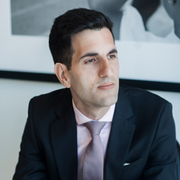
– Paul Salvatori is a Toronto-based journalist, community worker and artist. Much of his work on Palestine involves public education, such as through his recently created interview series, “Palestine in Perspective” (The Dark Room Podcast), where he speaks with writers, scholars and activists. He contributed this article to The Palestine Chronicle.


